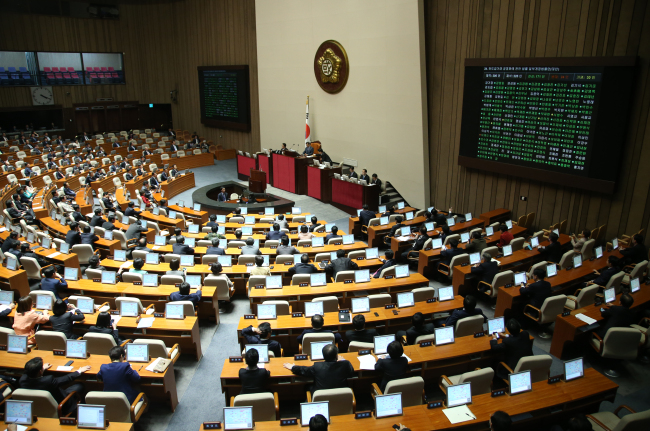The National Assembly on Tuesday approved plans to raise the retirement age to 60, and passed a key economic democratization measure that will bring into force tougher penalties for unfair subcontracting transactions.
The measures are part of economic democratization efforts, which have been strongly opposed by pro-business lobbies that argue the changes will incur significant costs for businesses.
 |
Lawmakers vote on bills during a plenary session at the National Assembly on Tuesday. (Yonhap News) |
On Monday, the deputy chiefs of the country’s five main pro-business lobbies including the Federation of Korean Industries lodged complaints over related plans to Saenuri Party floor leader Rep. Lee Hahn-koo and other ruling party lawmakers.
As per the revised Fair Transactions in Subcontracting Act, companies inflicting losses on subcontractors through unfair practices will be subjected to fines of up to three times the damages.
Practices that will incur the strengthened penalties include misappropriation of technical data from the subcontractor, and reducing payment, canceling contracts and returning supplied goods without due cause.
Although the changes to the act have been seen as a vital step for so-called economic democratization, a major election pledge of President Park Geun-hye, related measures have raised strong opposition from large businesses.
Aside from the subcontracting act revision, the legislation committee also approved plans to freeze interest on student loans while the borrowers are fulfilling national service.
Ruling and opposition party lawmakers of the legislation committee, however, failed to reach agreement on plans to place heavy fines on companies that illegally dump harmful chemicals. The plans have also been opposed by local businesses.
In contrast, changes to the Restriction of Special Taxation Act and the Restriction of Special Local Taxation Act were processed during Tuesday’s plenary session without much difficulty as part of the government’s real estate market stimulus package.
Under the measures, which will be applied retroactively from April 1, the acquisition tax will be exempted for first-time homebuyers who purchase properties costing less than 600 million won ($545,000).
The measure, however, does not apply to buyers whose annual income combined with that of their spouse exceeds 70 million won.
The measure will last until the end of the year, and no limitation on the size of the property will be imposed.
In addition, residential properties less than 85 square meters or worth under 600 million won will be exempted from capital gains tax when the seller owns only one property. The transfer tax exemption will stand for five years.
By Choi He-suk
(
cheesuk@heraldcorp.com)








![[Weekender] Korea's traditional sauce culture gains global recognition](http://res.heraldm.com/phpwas/restmb_idxmake.php?idx=644&simg=/content/image/2024/11/21/20241121050153_0.jpg)